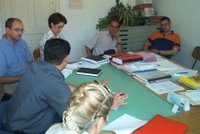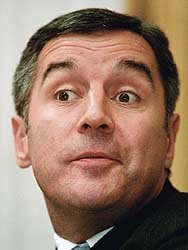
TRGOVISTE, Serbia, April 20 - This could be a hard year for Serbia, whichrisks seeing both the province of Kosovo and the state of Montenegro break
away.
And then there is Trgoviste.
About 20 miles up a dead-end road next to Serbia's border with Macedonia,
Trgoviste is a backwater, a place that few people other than its 1,600
residents have reason to visit. It was all but unknown in Serbia. Until
January, that is, when local officials began talking of severing their ties
to Belgrade.
That was a surprise, considering that Trgoviste is 98 percent Serb. It has
only three non-Serb families, who are Macedonian, according to Jovica
Mihajlovic, the mayor's chief adviser and manager.
It is a placid town surrounded by unruliness. Southern Serbia's rich mix of
ethnic groups makes the region a fertile ground for separatists. Ethnic
Albanians in the nearby Presevo valley who were trying to unite with Kosovo
fought Serbian security forces in 2000 and 2001.
Neighboring Bosilegrad, part of Bulgaria until 1919 and whose population is
still mainly Bulgarian, has had frequent run-ins with the central
government.
But Trgoviste has remained quiet, and therein lies the problem. While the
Serbian government has paid attention to more troublesome areas, this town
has been forgotten, Mr. Mihajlovic said. So now, he is organizing a
referendum on breaking ties with Serbia and backing an alliance with
Macedonia.
Local officials say the government has long failed to reverse a decision
made almost 15 years ago that doomed their town. Until 1992, Trgoviste lay
on one of the main roads crossing the Balkans and connecting Europe and
Turkey. The town was a commercial center for villages in nearby Macedonia,
then still part of Yugoslavia.
But Yugoslavia was imploding, and Macedonia voted to break way. As a result,
the main road to Macedonia was closed, and Trgoviste lost its purpose
overnight, said Radovan Stojanovic, who is the mayor and the town doctor.
"This was all Yugoslavia, and you just drove into Macedonia; there wasn't a
border," Mr. Stojanovic said. After the separation, he said, Serbia created
two border crossings elsewhere and then closed the main road, about five
miles beyond Trgoviste.
"After that, the deterioration of Trgoviste started," he added.
The closed road accelerated a decline that was already being felt across
Serbia, as it pursued wars in Croatia and Bosnia. Now Serbia is experiencing
modest economic growth, but there is little sign of any benefits reaching
Trgoviste. Once hundreds of trucks passed through this town on any day. Now,
dogs lie in the street undisturbed.
As businesses failed, people moved elsewhere to find work and the population
of the town and its surrounding villages slumped to just 6,500 from 22,000,
Mr. Stojanovic said.
On a tour of the town, he explained that it was $300,000 in debt and had not
paid its employees since September. The struggle to keep basic services
running seems to have taken a toll on the mayor himself, a nervous man with
thinning hair and fraying black tennis shoes.
"We are a poor municipality and we are trying to do as much as we can, but
we can't do much more," he said.
The bid to join Macedonia, officials here admit, may be more a cry for help
than a serious attempt to break from Serbia.
Macedonia seems far from enthusiastic about being joined by a poor Serbian
town. "It's a matter of international borders," said Sasa Colakovski, a
spokesman for the Macedonian government. "It cannot be settled by a
referendum."
Mr. Mihajlovic said the town would like the same status as the Presevo
region, whose government financing has increased since the conflict there
ended.
The Serbian government, weary of an ever-diminishing state, has finally
taken notice of Trgoviste. Most of the country's major newspapers have sent
reporters to the town since it announced its plans for the referendum. On
April 7, President Boris Tadic visited.
Mr. Tadic promised he would study the possibility of reopening the road to
Macedonia, but he admonished the mayor's adviser for proposing the
referendum.
"He said such statements should not have been made with out consulting the
relevant officials in the Serbian government," Mr. Stojanovic said.

